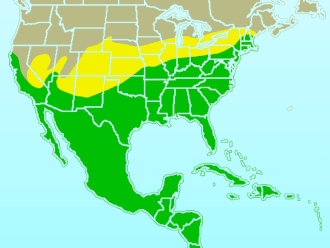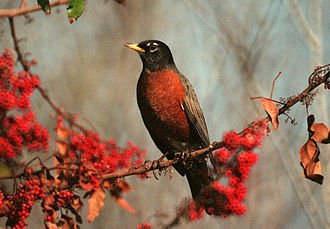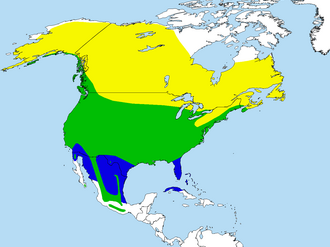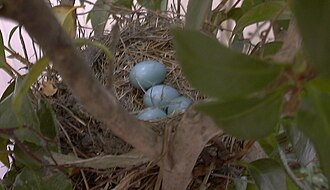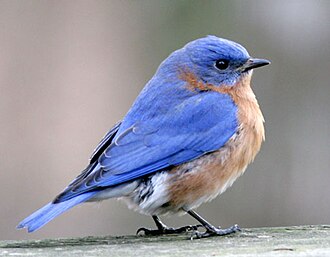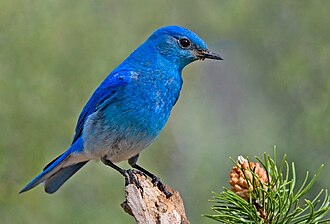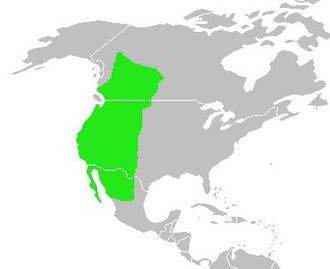Field Guide/Birds/Western US and Canada
The range maps presented here are color-coded, with yellow indicating the summer range, blue indicating the winter range, and green indicating the year-round range. Some of the range maps do not follow this color code, but it is not difficult to decode them.
Passerine (perching birds)
| Mimus polyglottos (Northern Mockingbird) | |
|---|---|
| Description | |
| The Northern Mockingbird builds a twig nest in a dense shrub or tree, which it aggressively defends against other birds and animals, including humans. When a predator is persistent, Mockingbirds from neighboring territories, summoned by a distinct call, may join the attack. Other birds may gather to watch as the Mockingbirds harass the intruder. This bird is mainly a permanent resident, but northern birds may move south during harsh weather. Mockingbirds have a strong preference for certain trees such as maple, sweetgum, and sycamore. They generally avoid pine trees after the other trees have grown their leaves. Also, they have a particular preference for high places, such as the topmost branches of trees. Although many species of bird imitate other birds, the Northern Mockingbird is the best known in North America for doing so. It not only imitates birds but also other animals and mechanical sounds. | |
| Turdus migratorius (American Robin) | |
|---|---|
| Description | |
| The American Robin has gray upperparts and head, and orange underparts, usually brighter in the male. Robins are frequently seen running across lawns, picking up earthworms by sight. In fact, the running and stopping behavior is a distinguishing characteristic. When stopping, they are believed to be listening for the movement of prey. | |
Adventist Youth Honors Answer Book/Nature/Birds/White-breasted Nuthatch
| Sialia (Bluebird) | |
|---|---|
| Description | |
| These are one of the relatively few thrush genera to be restricted to the Americas. As the name implies, these are attractive birds with blue, or blue and red, plumage. Female birds are less brightly colored than males, although color patterns are similar and there is no noticeable difference in size between sexes. There are three species of bluebird; the Eastern Bluebird, the Mountain Bluebird, and the Western Bluebird. The Western Bluebird is very similar to the Eastern Bluebird in appearance. | |
Adventist Youth Honors Answer Book/Nature/Birds/Redwinged Blackbird
Adventist Youth Honors Answer Book/Nature/Birds/American Crow
Adventist Youth Honors Answer Book/Nature/Birds/Gray Catbird
Adventist Youth Honors Answer Book/Nature/Birds/Brown-headed Cowbird
Piciformes (woodpeckers)
Adventist Youth Honors Answer Book/Nature/Birds/Red-headed Woodpecker
Adventist Youth Honors Answer Book/Nature/Birds/Pileated Woodpecker
Hummingbirds
Caprimulgiformes
Adventist Youth Honors Answer Book/Nature/Birds/Whip-poor-will
Galliformes (turkeys, chickens, grouse, quails, and pheasants)
Columbidae (doves and pigeons)
Adventist Youth Honors Answer Book/Nature/Birds/Rock Pigeon
Adventist Youth Honors Answer Book/Nature/Birds/Stock Pigeon
Adventist Youth Honors Answer Book/Nature/Birds/Band-tailed Pigeon
Adventist Youth Honors Answer Book/Nature/Birds/White-tipped Dove
Falconiformes (eagles, falcons, and hawks)
Adventist Youth Honors Answer Book/Nature/Birds/Bald Eagle
Adventist Youth Honors Answer Book/Nature/Birds/Golden Eagle
Adventist Youth Honors Answer Book/Nature/Birds/Peregrine Falcon
Adventist Youth Honors Answer Book/Nature/Birds/Red-tail Hawk
Adventist Youth Honors Answer Book/Nature/Birds/Osprey
Ciconiiformes (storks, herons, egrets)
Adventist Youth Honors Answer Book/Nature/Birds/Great Blue Heron
Adventist Youth Honors Answer Book/Nature/Birds/Great Egret
Charadriiformes (waders, gulls, and auks)
Adventist Youth Honors Answer Book/Nature/Birds/Herring Gull
Adventist Youth Honors Answer Book/Nature/Birds/Semipalmated Sandpiper
Anseriformes (ducks, geese, and swans)
Adventist Youth Honors Answer Book/Nature/Birds/Canada Goose
Adventist Youth Honors Answer Book/Nature/Birds/Northern Pintail

